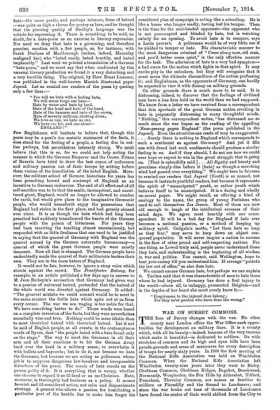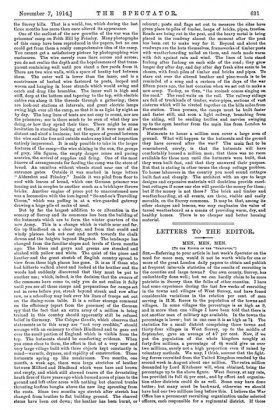WAR ON SURREY COMMONS. T HE face of Surrey changes with
the war. No other county near London offers the War Office such oppor- tunities for development on military lines. It is a county which, with all its beauty—indeed, because of the very reasons which make it beautiful—is dedicated to soldiers. Its wide stretches of common and its high and open hills have been parade-grounds and areas of manceuvre for every description of troops for nearly sixty years. In 1860 the first meeting of the National Rifle Association was held on Wimbledon Common. When the National Rifle Association left Wimbledon twenty-nine years later they went to Bisley. Chobham Common, Chobham Ridges, Bagshot, Brookwood, Normandy, Worplesdon, the Fox Hills by Aldershot, Tilford, Frensham, Thursley Common, are names as familiar to soldiers as Piccadilly and the Strand to Londoners ; and since the war broke out tens of thousands of Londoners have found the centre of their world shifted from the City to
the Surrey hills. That is a world, too, which during the last three months has more than once altered its appearance.
One of the earliest of the new growths of the war was the prisoners' camp on Frith Hill by Frimley. Many photographs of this camp have been reproduced in the papers, but no one could get from them a really comprehensive idea of the camp. You cannot get a satisfactory picture by photographing wire enclosures. The wire merely runs lines across and across; you do not realize the depth and the hopelessness of that trans- parent containing wall until you stand a few yards from it. There are two wire walls, with a space of heathy turf between them. The outer wall is lower than the inner, and is a contrivance of barbed wire fastened to posts, looped and woven and hanging in loose strands which would swing and catch and drag like brambles. The inner wall is high and stiff, deep at the bottom and tapering to the top, with electric cables run along it like threads through a gathering; there are look-out stations at intervals, and great electric lamps swing high over all the camp, so that it is as light by night as by day. The long lines of tents are not easy to count, nor are the prisoners; nor is there much to be seen of what they are doing, or how they spend their time. There might be some hesitation in standing looking at them, if it were not all so distant and aloof a business; but the space of ground between the wire and the free soil outside makes any kind of inspection entirely impersonal. It is only possible to take in the larger features of the camp--the wire shining in the sun, the groups of grey, idle figures, the empty danger zones and pacing sentries, the arrival of supplies and firing. One of the most bizarre of arrangements for feeding the camp was the store of bread. An omnibus without wheels stood near one of the entrance gates. Outside it was marked in large letters "Aldershot and Frimley." Inside it was piled from floor to roof with loaves of bread, which one German prisoner was tossing out in couples to another much as a bricklayer throws bricks. Another engine of peace put to unaccustomed uses was a locomotive with the iron legend "So-and-so's Travelling Circus," which was puffing in at a wire-guarded gateway drawing a huge pile of sacks of meal.
But by far the largest addition to or alteration in the scenery of Surrey and its commons has been the building of the hutments which are to form the winter quarters of the new Army. This is a change which is visible near and far. Go up Hindhead on a clear day, and from that sunlit and windy plateau look out east and north towards the chalk downs and the heights beyond Bagshot. The landscape has changed from the familiar slopes and levels of three months ago. The blues and greys and greens are streaked and slashed with yellow and white. The quiet of the pines and heather and the great stretch of English country spread to view from these high places has gone. It is as if those who bad hitherto walked about and looked at the heather and the woods had suddenly discovered that they must be put to another use ; which, indeed, is the decision that the owners of the commons have come to, only you do not realize it fully until you see all these camps and preparations for camps set out in rows before you, streak beyond streak and row after row, as a schoolboy may look over his lines of troops set out on the dining-room table. It is a rather strange comment on the efficiency (apart from the presence) of the German spy that the fact that an extra army of a million is being trained in this country should apparently still be refused belief in Germany. The Cologne Gazette, which observes that statements as to this army are "not very credible," should arrange with an emissary to climb Hindhead and to gaze out over the small portion of England which is visible from the top. The hutments should be comforting evidence. When you come close to them, the effect is that of a very new and very large village built with three objects kept constantly in mind—warmth, dryness, and rapidity of construction. These hutments spring up like mushrooms. Two months, one month, a week ago, there were large stretches of heather between Milford and Hindhead which were bare and brown and empty, and which still showed traces of the devastating heath fires of three years ago which burned acres of pines to the ground and left other acres with nothing but charred trunks thrusting leafless boughs above the new ling sprouting from the roots. Since two months ago stretch after stretch has changed from heather to flat building ground. The charred stems have been cut down; the heather has been burnt, or reburnt ; posts and flags set out to measure the sites have given place to piles of timber, heaps of bricks, pipes, trestles. Roads are being cut in the peat, and the heavy metal is being placed in the roadway almost the moment after the peat has been cut to make way for it. Beyond and about the roadways are the huts themselves, frameworks of timber posts with weatherboarding nailed on them, and roofs made warm with felt against rain and wind. The lines of huts stand furlong after furlong on each side of the road; they grow longer day after day, and day after day fresh sites seem to be chosen, with fresh piles of timber and bricks and pipes. To stare out over the altered heather and pine-woods is to be reminded of a song and a cartoon of the days of the war fifteen years ago, the last occasion when we set out to make a new army. To-day, as then, "the rooinek comes singing on the road." The road waits on the rail. The railway sidings are full of truckloads of timber, water-pipes, sections of vast cisterns which will be riveted together on the hills miles from the station. Time presses, the camps must be built faster and faster still, and soon a light railway, branching from the siding, will be sending trollies and navvies swinging up to the open heather from the main line from London to Portsmouth.
Hutments to house a million men cover a large area of ground. What will happen to the hutments and the ground they have covered after the war? The main fact to be remembered, surely, is that the hutments will have comfortably housed a million men ; that there was no room available for these men until the hutments were built, that they were built fast, and that they answered their purpose. But that is stating in other terms the cheap cottage problem. To house labourers in the country you need sound cottages built fast and cheaply. The architect with an eye to large designs and expensive materials will doubtless provide excel- lent cottages if some one else will provide the money for them; but if the money is not there ? The brick and timber and weatherboarding, at all events, are there, visible and easily movable, on the Surrey commons. It may be that, among its other changes and lessons, war may emphasize the value of tarred weatherboard as a means of providing warm, dry, and healthy homes. There is no cheaper and better housing material.















































 Previous page
Previous page